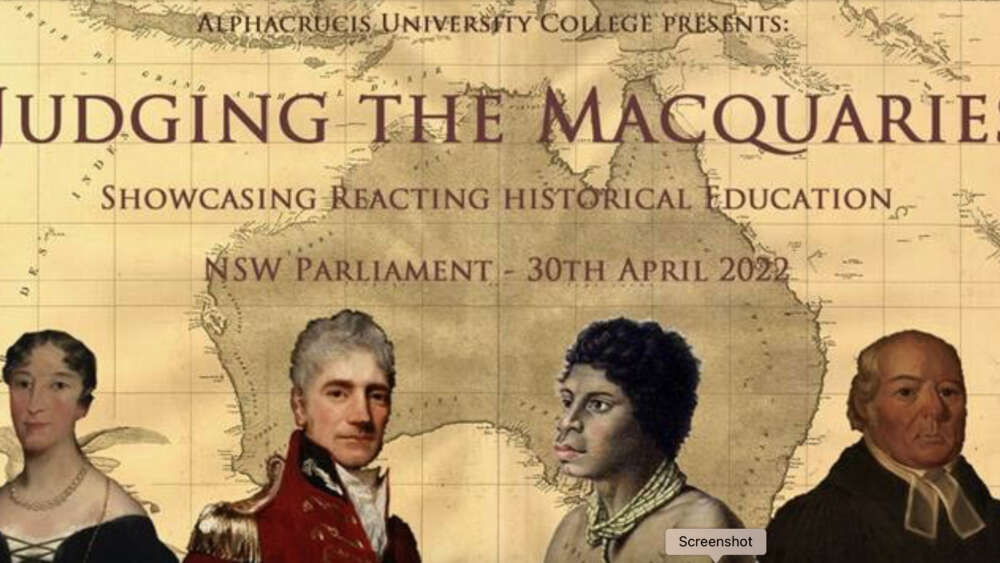Two hundred years after his departure from Australia, Governor Lachlan Macquarie, variously regarded as an enlightened builder or a colonist who oversaw First Nations’ massacres, is to be in the dock at a mock trial.
The mock trial will come at the end of a day-long historic re-enactment that will highlight tensions in the colony of New South Wales, Aboriginal relations, Church and state, and Macquarie’s leadership. The re-enactment will occur in the NSW Legislative Council chamber on April 30, with a dinner in the NSW Parliament Strangers Dining Room after the trial.
It’s a giant history game. Alphacrucis University College’s Nick Jensen tells Eternity: “The ‘Judging the Macquaries’ event involves 30 participants from across higher education and leadership groups who are assigned immersive character roles from the historical period with specific goals who must communicate, collaborate, and compete effectively to advance their objectives,”
“Reacting Education, the concept behind the event, is an award-winning active learning pedagogy of role-playing games designed for higher education to help students engage with history. It is widely used in the United States, being used at 350 colleges and universities, but has yet to break into Australia in any meaningful way.
“‘Judging the Macquaries’ is the first uniquely Australian history game to be developed, and can be used as a way to bring the challenging issues of Aboriginal relations and colonisation into universities and schools.”
“The concept behind the event is an award-winning active learning pedagogy of role-playing games.” – Nick Jensen
Jensen believes that this method will allow different perspectives in history to be examined without toxicity.
The re-enactors come from Alphacrucis, Campion College, the Lachlan Macquarie Institute, World Vision’s Young Mob, and the Burrundi Theatre.
Burrundi is a Redfern-based First Nations group that aims to “celebrate and continue the legacy of sovereign arts and culture”. Partnering with the Burrundi Theatre means Indigenous characters will be played only by people with Indigenous heritage.
John Harris, whose new book Judging the Macquaries inspired this event, tells Eternity which of the issues raised by the Macquarie era still resonate.
“He believed that the colonisation of NSW meant that Aboriginal people gained the great privilege of becoming British subjects.” – John Harris
“The only issues of justice which would be considered debatable today concern the rights and treatment of Indigenous people,” he says.
“While the land had been invaded since 1788, that invasion was 22 years in the past by the time the Macquaries set foot in NSW.
“Macquarie was well aware that the Aboriginal people had suffered the loss of hunting grounds and fishing waters due to the taking over of lands and waters. He tried to compensate by granting farmland to Aboriginal people who were peaceful and cooperative. The wider injustice of invasion did not seem to occur to him. He accepted the right of the British to be there.
“He was a loyal servant of the British Empire and felt it was a Christian Empire. He believed that the colonisation of NSW meant that Aboriginal people gained the great privilege of becoming British subjects and that that was the greatest gift he could give them, to become his equal under the law. They had all the protection of British law if anyone harmed them. But they also came under all the penalties of British law if they broke it. He did not perceive that they may have preferred their autonomy in their own land. That, of course, has indeed been debated here at the highest levels before the courts in the land rights cases such as Mabo.
“He did not perceive that they may have preferred their autonomy in their own land.” – John Harris
“The most tragic results of the view that Aboriginal people were now British subjects were that British law could be enforced. For many years Macquarie refrained from ordering any reprisals against Aboriginal people, not even for murder, because he believed that they acted in response to mistreatment, especially the mistreatment of their women. Eventually, however, when it became evident that Aboriginal people from the mountains were attacking farms in west and southwest of Sydney, he sent the military against them. Tragically, 13 Aboriginal people were killed southwest of Sydney in what is now called ‘the Appin Massacre’.
“If a modern court were to debate the legality or the injustice of this, they would have to ask whether Macquarie was acting within the law as he understood it. My view in all this, of course, is that Lachlan Macquarie made a grievous error, but that he believed too strongly in the Empire he served. The sin was not so much his as the sin of the Empire itself.”
To attend this event click here.
Email This Story
Why not send this to a friend?



